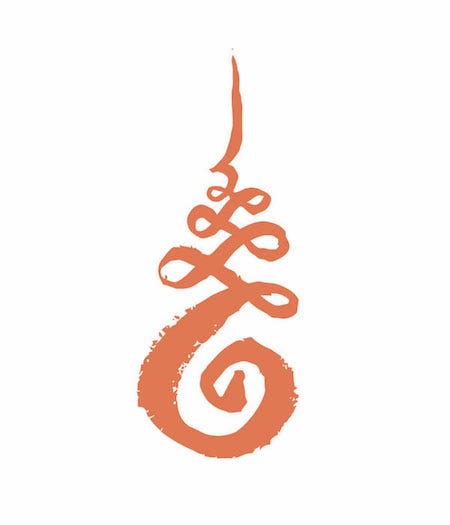The Perfect Way

“Your perception determines how you experience the world”, a voice rang in my head as I woke up this morning. I could feel how my first thoughts were having a chemical influence on my body and how I could change my state by changing my perceptions. I heard an inner command to “take control” of my perceptions to manage my internal reality and thus influence my external one in an empowered way.
This path of control and total self-responsibility, essential to spiritual cultivation and personal maturity, has been drilled into me through years of Buddhism and yogic studies that emphasize mindfulness and controlling the modifications of the mind.
Shortly after my morning practice, I went upstairs to get my father whom I’m currently supporting on a journey to reclaim his health following a wake-up call of spinal surgery. Part of our daily routine involves a walking meditation on the grass where we pay attention to the movement of our feet, the quality of our breath, the sounds around us the interplay between our thoughts and the environment.
As we walked he shared with me that he’s internally repeating a tasbih (sufi mantra) he received as a kid, wondering if it was the right thing to do. When he spoke the mantra to me I could sense that he didn’t have a real feeling connection to the tasbih…the word wasn’t matched by an adequate feeling to give it the transformative power a tasbih can have.
“Tasbih is a form of dhikr (remembrance) that involves the repetitive utterances of a phrase or short sentences in the praise and glorification of Allah, in Islam”
To illustrate this point I told him a story that was shared with me by my first music teacher:

Once upon a time there was a great Master with many disciples. It came to his attention that a very sincere devotee had been chanting a certain mantra with great enthusiasm which, when overheard by another disciple, informed the master that this poor man had been chanting it incorrectly.
A great surge of compassion arose in the master and he decided to make the journey to visit this devotee, who happened to live on a remote island in the middle of a large lake. They rowed across the lake to the island on which he lived and upon arrival the devotee came running out with tears in his eyes.
“Beloved Master,” he said “what have I done to deserve this act of grace, why have you have come to visit a nobody like me?” The Master replied “I have heard that you are a devotee of great sincerity and that you’ve been chanting a certain mantra day and night, but have been doing so incorrectly. I have come to teach you how to say it properly so that the fruits of your efforts will not go to waste, many sages have attained great powers through this mantra and you too may achieve the same.”
This devotee was overjoyed and he listened with rapt attention as the Master taught him the correct way. The Master then left, having accomplished his aim, when half-way on his return journey he heard a sound and turned around. From a distance he could see this devotee running across the water calling out his Masters name! When he arrived at the boat he fell at the Masters feet exclaiming “Beloved Master! Being as feeble minded as I am, I have already forgotten what you taught me. Please teach me how to say it again.”
The Master, now greatly humbled, replied “You continue chanting it just as you were, forget what I’ve told you and remember only the feeling you’ve carried in your heart when you chant”.
My music teacher would sometimes joke that you could chant the words “coca-cola” with the right feeling and intention and have more results then mindlessly chanting a religious phrase. Though a bit tongue-in-cheek, my experience has shown it to be true — sincerity is the highest of all virtues when it comes to many spiritual efforts.
Yet, while this story carries a universal message, sometimes our lack of feeling is due to a lack of understanding. This is particularly common in religions where we’re often made to repeat words without knowing their deeper meanings and by people who’ve never matured to esoteric understandings themselves. So as my father and I continued to walk I shared with him the meaning of the first word of the opening of the Quran and its suras (chapters) “Bismillah”:

Bismillah is usually translated as “In the Name of Allah”, yet it carries a deeper meaning. Firstly, that Allah is not a thing that exists independently of creation — it is the very source from which creation arises and is sustained, thus all things exist in the name of Allah. It is this fundamental recognition that brings us to the place of humility, gratitude and surrender that is the initiation, journey and fulfillment of prayer, particularly in Islam.
As we continued to walk I asked my father if he had created the grass we were walking on? Had he created the body that was carrying him? The breath that was animating his body to life? As I asked these questions I too was brought into a place of greater expansion and devotion, remembering that this very moment was happening by the Grace of the eternal process and ultimate Reality that one people and religion calls “Allah”.
Reminded that the joy of surrender lies in letting go of my limited self and opening up to the Creative force of existence and the majesty of Being, my earlier command to remain in “control of my perceptions” gave-way to a heartfelt submission to the will of the Divine and my dependence upon it for all things good, beautiful and true.
Returning to my room and sitting in contemplation, I noticed the juxtaposition of my waking thoughts on mental discipline with the state of surrender I’d just found myself in. I accepted that a tension of opposites exists within me and that it’s necessary to honor and embrace this polarity as the call and response dialogue of my own psyche and soul. Control and surrender, structure and spontaneity, creative and receptive…we must have space for both in our lives to live in a state of wholeness and totality.
Indeed, all Masters have taught this in their own ways; the path of balance between mastering our minds and surrendering our hearts. The journey for each individual is to make this tension of apparent opposites — the play of polarities that is fundamental to the human experience — a creative process that furthers our spiritual evolution and enriches those around us.
In doing so we become an artist of our lives, an instrument of the Infinite, and an author of our own Perfect Way.


